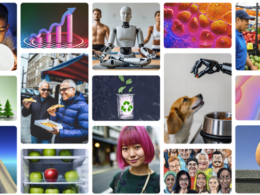Chet Kapoor, CEO of DataStax, a leading company providing a cloud database based on open-source Apache Cassandra, made bold claims about the suitability of Cassandra for the rapidly growing field of generative AI. At the recent AI.Dev conference held in Silicon Valley, Kapoor declared Cassandra as the “best f*cking database for gen AI.” The audience of 700 people listened carefully as Kapoor articulated the reasons behind his bullishness, highlighting the advantages of DataStax Cassandra in the face of fierce competition.
Competition in the Gen AI Landscape
With a surge of new startups and established companies vying for dominance in the gen AI space, the database choices made by enterprise brands are of utmost importance. Kapoor pointed out that while significant attention has been given to large language model (LLM) providers such as OpenAI, Anthropic, Google (Gemini), and Meta (Llama), the database selection for storing and retrieving data used in LLM applications is also highly competitive.
“Cassandra is already one of the most reliable operational databases widely used by enterprise companies,” Kapoor emphasized. He highlighted early customer success stories, showcasing companies that have successfully deployed generative AI at scale using Cassandra. DataStax’s technological prowess in areas relevant to generative AI, such as reliability and performance, gives it an edge over key rivals like MongoDB and Pinecone, according to Kapoor.
It’s worth noting that DataStax is considering going public, and Kapoor’s enthusiasm may be partly driven by his desire to make some noise in the industry. Last year, the company raised $115 million on a $1.6 billion valuation, positioning itself for potential future growth and expansion.
Cassandra: The Advantageous Choice
While cloud giants like Microsoft and Amazon assert the superiority of their integrated cloud offerings for generative AI tasks, Kapoor highlighted a key advantage of Cassandra. He argued that these cloud companies, despite offering a wide array of databases and encouraging users to consolidate on their platforms, have largely focused on analytical workloads and business intelligence applications. In contrast, Cassandra is already a popular choice for operational workloads and has gained the trust of Fortune 500 companies.
“Cassandra boasts 90 percent of those companies as customers,” said Ed Anuff, Chief Product Officer at DataStax. Major corporations like Netflix, FedEx, Apple, and Home Depot rely on Cassandra for critical operations. As these industry giants venture into AI app development, their established relationship with Cassandra gives the database a strong advantage over its competitors.
Moreover, Microsoft and Amazon have recognized the need to offer choice to customers. While both provide their own databases, they also enable users to easily utilize Cassandra within their cloud ecosystems. This flexibility allows customers to avoid vendor lock-in, a key concern in the rapidly evolving AI landscape.
Kapoor also emphasized the importance of vector search, a crucial requirement for generative AI databases. He revealed that DataStax’s JVector vector search technology outperforms competitors, with results that are 16 percent more relevant than Pinecone’s. In terms of performance, Astra DB, DataStax’s cloud-based Cassandra offering, surpassed both Pinecone and MongoDB in throughput and latency, making it the go-to choice for companies looking to unleash the true potential of generative AI.
The Promising Future of Gen AI
Kapoor exuded optimism about the future of generative AI, predicting that its adoption will happen at an unprecedented pace. Building on existing foundations of web, mobile, and cloud technologies, gen AI is expected to unleash transformative use cases and generate substantial revenue in the coming years. Kapoor envisioned a future where AI language models act as “agents,” orchestrating complex tasks beyond simple question answering and recommendation-making.
While Kapoor and Anuff were quick to highlight the advantages of Cassandra, they acknowledged that the entire database sector will experience growth driven by generative AI. With gen AI applications consuming significantly more storage and compute resources compared to other workloads, providers across the industry are vying for a piece of the pie. Kapoor suggested that AI applications will be the primary growth driver for both private and public database companies for years to come.










